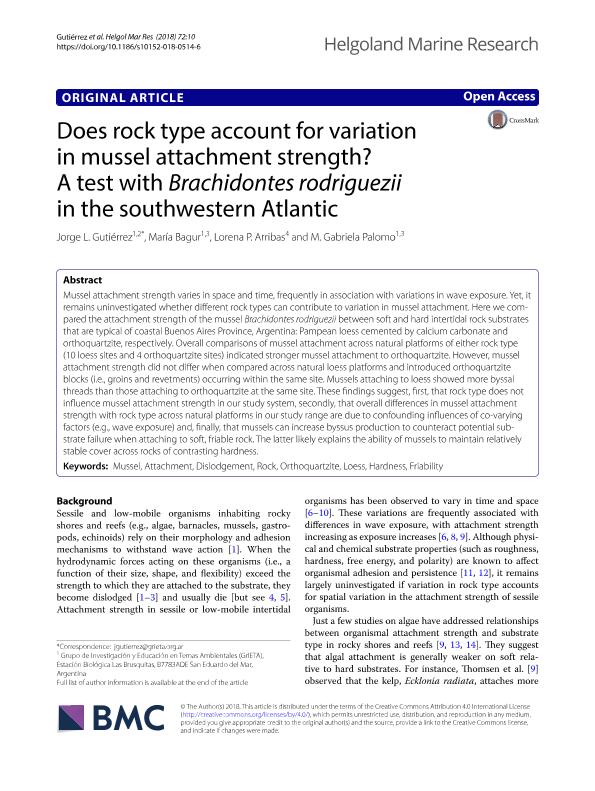Artículo
Does rock type account for variation in mussel attachment strength? A test with Brachidontes rodriguezii in the southwestern Atlantic
Fecha de publicación:
06/2018
Editorial:
Springer
Revista:
Helgoland Marine Research
ISSN:
1438-387X
Idioma:
Inglés
Tipo de recurso:
Artículo publicado
Clasificación temática:
Resumen
Mussel attachment strength varies in space and time, frequently in association with variations in wave exposure. Yet, it remains uninvestigated whether different rock types can contribute to variation in mussel attachment. Here we compared the attachment strength of the mussel Brachidontes rodriguezii between soft and hard intertidal rock substrates that are typical of coastal Buenos Aires Province, Argentina: Pampean loess cemented by calcium carbonate and orthoquartzite, respectively. Overall comparisons of mussel attachment across natural platforms of either rock type (10 loess sites and 4 orthoquartzite sites) indicated stronger mussel attachment to orthoquartzite. However, mussel attachment strength did not differ when compared across natural loess platforms and introduced orthoquartzite blocks (i.e., groins and revetments) occurring within the same site. Mussels attaching to loess showed more byssal threads than those attaching to orthoquartzite at the same site. These findings suggest, first, that rock type does not influence mussel attachment strength in our study system, secondly, that overall differences in mussel attachment strength with rock type across natural platforms in our study range are due to confounding influences of co-varying factors (e.g., wave exposure) and, finally, that mussels can increase byssus production to counteract potential substrate failure when attaching to soft, friable rock. The latter likely explains the ability of mussels to maintain relatively stable cover across rocks of contrasting hardness.
Palabras clave:
ATTACHMENT
,
DISLODGEMENT
,
FRIABILITY
,
HARDNESS
,
LOESS
,
MUSSEL
,
ORTHOQUARTZITE
,
ROCK
Archivos asociados
Licencia
Identificadores
Colecciones
Articulos(CCT - MAR DEL PLATA)
Articulos de CTRO.CIENTIFICO TECNOL.CONICET - MAR DEL PLATA
Articulos de CTRO.CIENTIFICO TECNOL.CONICET - MAR DEL PLATA
Citación
Gutierrez, Jorge Luis Ceferino; Bagur, María; Arribas, Lorena Pilar; Palomo, Maria Gabriela; Does rock type account for variation in mussel attachment strength? A test with Brachidontes rodriguezii in the southwestern Atlantic; Springer; Helgoland Marine Research; 72; 1; 6-2018; 1-11
Compartir
Altmétricas




